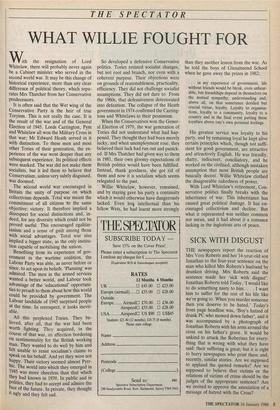THE SPECTATOR
WHAT WILLIE FOUGHT FOR
th the resignation of Lord Whitelaw, there will probably never again be a Cabinet minister who served in the second world war. It may be this change of historical experience, more than any clear difference of political theory, which sepa- rates Mrs Thatcher from her Conservative predecessors.
It is often said that the Wet wing of the Conservative Party is the heir of true Toryism. This is not really the case. It is the result of the war and of the General Election of 1945. Lords Carrington, Pym and Whitelaw all won the Military Cross in that war; Mr Edward Heath served in it with distinction. To these men and most other Tories of their generation, the ex- perience of the war went deeper than any subsequent experience. Its political effects were marked. The war did not make them socialists, but it led them to believe that Conservatism, unless very subtly disguised, was doomed.
The seeond world war encouraged in Britain the unity of purpose on which collectivism depends. Total war meant the commitment of all citizens to the same objective: victory. It therefore implied a disrespect for social distinctions and, in- deed, for any diversity which could not be proved useful. This encouraged egalitar- ianism and a sense of guilt among those With social advantages. Total war also implied a bigger state, as the only institu- tion capable of mobilising the nation. Benefiting from its experience of gov- ernment in the wartime coalition, the Labour Party was able, as never before or since, to act upon its beliefs. 'Planning' was admired. The men in the armed services wanted a better world, and Labour took advantage of the 'educational' opportuni- ties to preach to them about how this world could be provided by government. The Labour landslide of 1945 surprised people at the time. In retrospect, it looks inevit- able.
All this perplexed Tories. They be- lieved, after all, that the war had been worth fighting. They acquired, in the course of that war, an affection bordering on sentimentality for the British working man. They wanted to do well by him and felt unable to resist socialism's claims to Speak on his behalf. And yet they were not happy. Their victory seemed almost Pyrr- hic. The world into which they emerged in 1945 was more cheerless than that which they had known in 1939. In public and in Politics, they had to accept and admire the face of the future. In private, they thought it ugly and they felt sad. So developed a defensive Conservative politics. Tories resisted socialist changes, but not root and branch, nor even with a Coherent purpose. Their objections were on grounds of reasonableness, practicality, efficiency. They did not challenge socialist assumptions. They did not dare to. From the 1960s, that defensiveness deteriorated into defeatism. The collapse of the Heath government in 1974 confirmed the Caning- tons and Whitelaws in their pessimism.
When the Conservatives won the Gener- al Election of 1979, the war generation of Tories did not understand what had hap- pened. They thought they had been merely lucky, and when unemployment rose, they believed their luck had run out and panick- ed. If Mrs Thatcher had given way to them in 1981, their own gloomy expectations of British politics would have been fulfilled. Instead, thank goodness, she got rid of them and now it is socialism which seems relegated to the past.
Willie Whitelaw, however, remained, and by staying gave his party a continuity which it would otherwise have dangerously lacked. Even less intellectual than his fellow Wets, he had learnt more strongly than they another lesson from the war. As he told the boys of Glenalmond School when he gave away the prizes in 1982:
. . . in my experience of government, life without friends would be bleak, even unbear- able, but friendships depend in themselves on the mutual sympathy, understanding and, above all, on that sometimes derided but crucial virtue, loyalty. Loyalty to organisa- tions, loyalty to a community, loyalty to a country and in the final event putting these loyalties above one's own personal feelings.
His greatest service was loyalty to his party, and by remaining loyal he kept alive certain principles which, though not suffi- cient for good government, are attractive and attractively English. He was friendly, chatty, indiscreet, conciliatory, and he worked on the civilised, although mistaken assumption that most British people are basically decent. Willie Whitelaw clothed the disagreeable nakedness of power.
With Lord Whitelaw's retirement, Con- servative politics finally breaks with the inheritance of war. This inheritance has caused great political damage. It has en- couraged collectivism and decline. But what it represented was neither common nor mean, and it had about it a romance lacking in the inglorious arts of peace.


















































 Previous page
Previous page